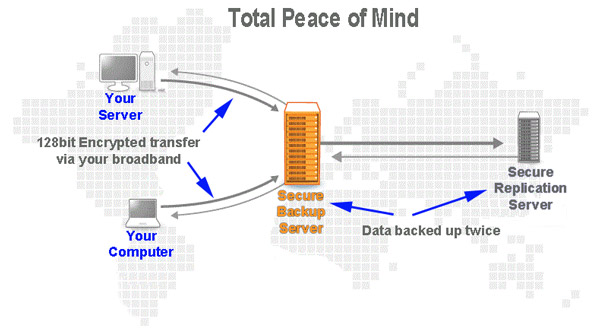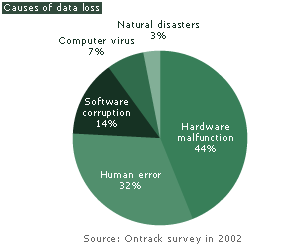Data loss is a nightmare

 Your data are growing exponentially
Your data are growing exponentially
If you find yourself now in a situation where you have to deal with an explosion in the volume of your business data, you are not alone. The accelerating pace of data creation, accumulation, and diffusion is becoming an increasingly common phenomenon among companies throughout the world today. Data are growing exponentially due to widespread use of the Internet, email, and media-rich software. As early as 2002, International Data Corporation (IDC) projected a dizzying annual data growth rate of 80%.
 1MB of data is worth £6,000
1MB of data is worth £6,000
Viewed from a strategic perspective, your data represent the core of your business. You have invested a lot of TIME, MONEY and EFFORT in developing your business data. Contracts, sales records, proposals, accounting records, marketing material, business contacts, emails, and even digital photos taken in important events, etc., make up the bulk of your invaluable business assets, which you cannot afford to lose. Studies have shown that:
- 1MB of data is worth approximately £6,000. 1
- Re-building just 20MB of lost data could cost more than £10,000 and take nearly three weeks to complete. 2
- A leaked record may cost you £120 to rectify. 3
- Retrieval of data from a crashed hard drive is often extremely costly, and there is NO GUARANTEE of success! 1
 Data loss makes your business suffer
Data loss makes your business suffer
Your business data go hand in hand with your business operations. The loss of such data, or even their temporary inaccessibility, may threaten your hard-earned competitive position. Companies without proactive backup and recovery policies are likely to be OUT OF BUSINESS within 2 years of a major disaster. 4 Loss of business data may ruin your company’s reputation, and may lead to expensive litigation. Worst of all, it interrupts your business continuity.

 Conventional approaches to backup are not good enough
Conventional approaches to backup are not good enough
Poor “unstructured” conventional backup methodologies, such as tape, CD Rom, and external hard drive, etc., are not good enough because of:
- High failure rates during restoration
- Slow read / write speed
- Difficulty in detecting problems of backup before performing restoration
- High maintenance cost
- Expensive offsite storage of tape library
- Reduced flexibility for backup caused by fixed capacity per backup media
- Increased likelihood of occurrence of negligence-induced problems (e.g. lost or misplaced data)
1David M. Smith, PhD. "The importance of investing in that ounce of prevention.” The Cost of Lost Data. 2009.
2Recent study from Ontrack Data
3Breach Study,Oct. 2010 Ponemon Institute
4Study by the National Archives and Records Administration

 Products
Products